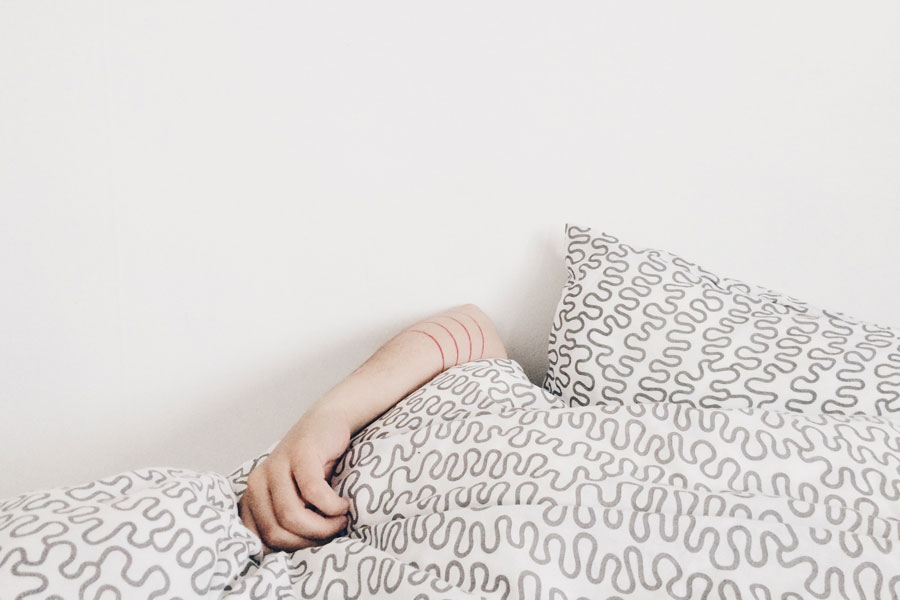1. Get some sleep
 People say that there isn't anything a nap can't fix, and while this may be a bit of an exaggeration, it can be applied to trying to shake off some of the horrible symptoms you get when you have a cold. The stereotype of the first few weeks of being a fresher is a lot of staying up all night partying and just generally enjoying your newly-found freedom of university life.
However, the sleep deprivation will catch up to you, and if you have freshers' flu, chances are you've been up all night sneezing and coughing, which is never going to put you in the best of moods. Try and make sure you get a good night's sleep by going to bed at a suitable time. Your body is weak, and needs as much time to rest as possible. If you've got a fever (or worse), then don't go to university. It's not worth it, especially if your lectures are recorded and you can catch up from the comfort of your used-tissue covered room.
People say that there isn't anything a nap can't fix, and while this may be a bit of an exaggeration, it can be applied to trying to shake off some of the horrible symptoms you get when you have a cold. The stereotype of the first few weeks of being a fresher is a lot of staying up all night partying and just generally enjoying your newly-found freedom of university life.
However, the sleep deprivation will catch up to you, and if you have freshers' flu, chances are you've been up all night sneezing and coughing, which is never going to put you in the best of moods. Try and make sure you get a good night's sleep by going to bed at a suitable time. Your body is weak, and needs as much time to rest as possible. If you've got a fever (or worse), then don't go to university. It's not worth it, especially if your lectures are recorded and you can catch up from the comfort of your used-tissue covered room.
2. Say no to the nights out
This links in with getting enough sleep. Missing one or two nights out isn't the end of the world, and I can guarantee that a night out is the way to make you feel much worse. If you're already feeling rough, you don't want to add the effects of a hangover and only getting a few hours sleep to your list of symptoms. Save your money and suggest a night in with your housemates and watch a few movies or even play a board game or two. Chances are you are not the only person who isn't feeling well and while they may not admit it, they may be relieved at the thought of a quiet night in instead, and waking up hangover-free.3. Stock up on tissues and medicine
It may be the last thing you want to do but drag yourself out of bed (or persuade a friend to go for you!) and go to the local supermarket to stock up on the things you know will make you feel better. Tissues are an obvious essential, alongside decongestants, and painkillers. If you're going to buy extra medicine, think carefully about what symptoms you have and read the labels to work out exactly what you need/ are suitable for you. Failing that, ask the pharmacist for some advice.4. Comfort food
 While you're stocking up on the contents of the cold and flu aisle, why not consider picking up a little bit of comfort food. Pick up some fresh fruit and vegetables as the vitamins will help you to feel better, but also treat yourself a little. If you fancy some chocolate cake, buy some chocolate cake. When you have a cold or flu, it's easy to feel sorry for yourself. Sometimes you just need give yourself a little treat and have some comfort food.
While you're stocking up on the contents of the cold and flu aisle, why not consider picking up a little bit of comfort food. Pick up some fresh fruit and vegetables as the vitamins will help you to feel better, but also treat yourself a little. If you fancy some chocolate cake, buy some chocolate cake. When you have a cold or flu, it's easy to feel sorry for yourself. Sometimes you just need give yourself a little treat and have some comfort food.
5. Stay Hydrated
It may seem like such a basic solution, but in between the sneezing, paracetamol, and just generally feeling rubbish, it's easy to forget the most simple way to make you feel more refreshed: water. Drinking plenty of water will give you more energy, something you will probably be lacking, and help to heal your body quicker. While having freshers flu may seem like the end of the world (or just the fun of being at university) it will eventually pass and you will be feeling better again soon. Remember, if all else fails and after a few weeks you're still feeling run down, phone home to ask for advice, or book an appointment with your university doctor just to be sure.About the Author: Emilia Walker is a student at the University of Portsmouth studying English Literature. In her spare time, she enjoys reading and going to the beach.




